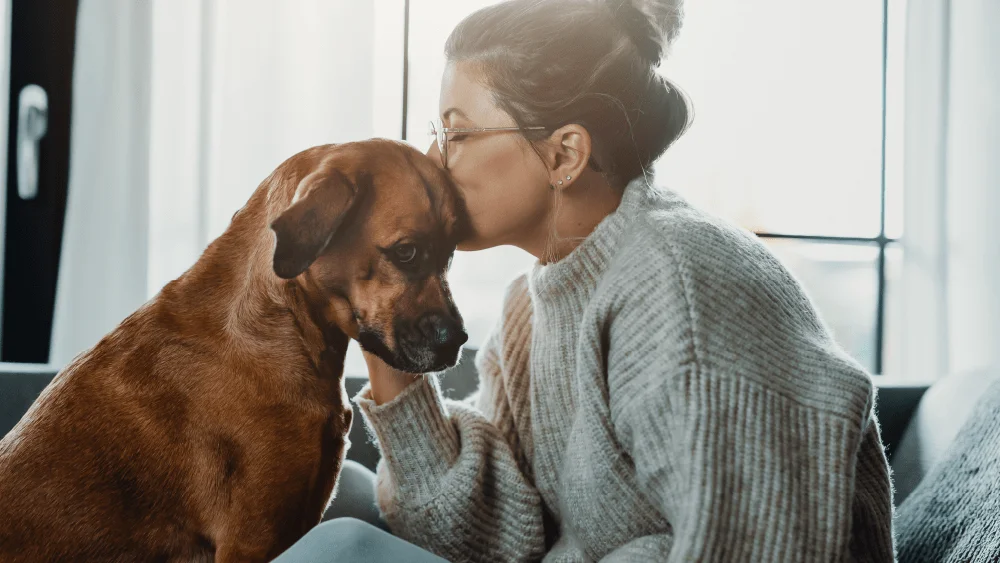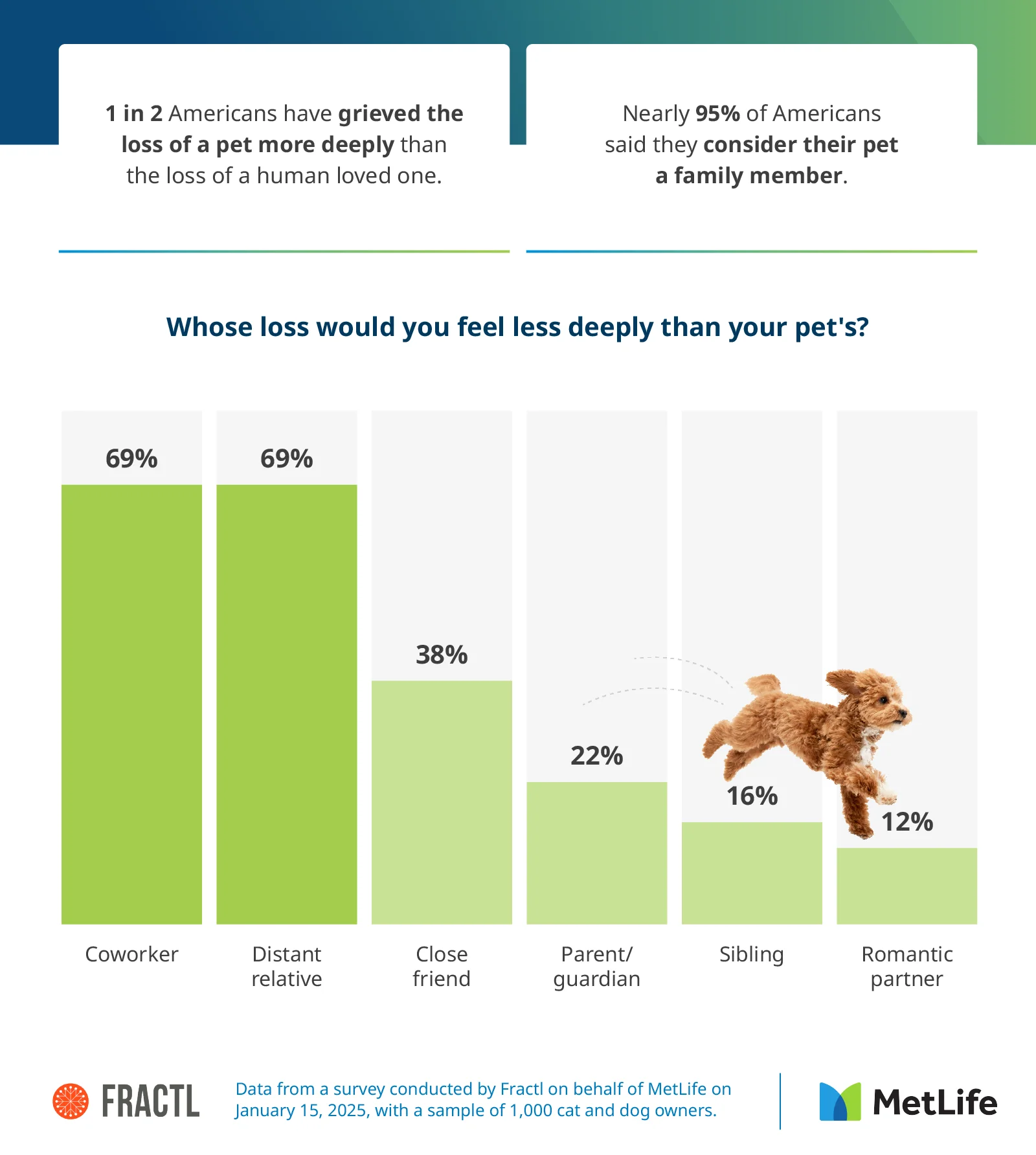PET PLANNING
For many Americans, pets are family members — deeply influencing life decisions and emotional bonds. But would they put their pet's needs above financial stability or take on a side gig to cover their medical expenses?
This article explores pet owners' sacrifices in keeping their pets healthy and happy, including financial commitments and ethical considerations for their medical care. Based on a survey of 1,000 American pet owners, we examine how these relationships influence people's decisions about budgeting, medical interventions, and even where to live.
From coping with pet loss to making significant lifestyle changes, our findings reveal just how profound the connections between pets and their owners are — and the lengths many are willing to go to for their beloved companions.
Key Takeaways
- Nearly 1 in 10 Americans (8%) want their pets to live for 50 or more years.
- Nearly 95% of Americans consider their pet a family member and have stronger bonds with them than with siblings (22%) or romantic partners (12%).
- 1 in 2 Americans have grieved the loss of a pet more deeply than the loss of a human loved one.
- Over 35% of Americans have skipped personal expenses to pay for their pet's needs.
- 1 in 4 pet owners would take on $10,000 or more in debt to save their pet's life.
How Far Would Pet Owners Go for Their Beloved Animals?
Americans make significant sacrifices for their pets, prioritizing their needs over personal expenses and even wishing for longer lifespans for their companions.

On average, Americans hoped their pets would live for around 15 years. Most Americans (80%) felt pets should live to a natural age for their species and breed, but 15% said they'd prefer them to live to an age that aligns with human lifespans (15%). While some (8%) wished their pets could live for 50 years or more, 5% said pets shouldn't outlive their owners.
So what would Americans sacrifice to help their pets live longer? For 95% of respondents, personal luxury items would be on the chopping block if it means extending their pet's life. More than a third of Americans (35%) have skipped personal expenses, like bills, groceries, and medical care, to meet their pet's health needs. Baby boomers and millennials were the most likely to have done so (38% of each), followed by Gen X (37%) and Gen Z (30%).
This reflects research suggesting that pets can offer health benefits — especially for older Americans — including fostering a sense of purpose and routine, helping build social connections, reducing feelings of loneliness, and providing emotional support and companionship.1
The Ethics and Economics of Caring for Pets
Next, we'll explore the ethical decisions and financial sacrifices Americans are willing to make for their pets, from costly medical treatments to significant lifestyle changes.
Many Americans (3 in 5) expressed that pursuing extreme medical interventions for their pets is ethical, with 15% willing to spend $10,000 or more on treatments that could double their pet's lifespan — such as innovative longevity treatments.2 Millennials (18%) and Gen Z (16%) were the most likely to be willing to spend that much, followed by Gen X (15%) and baby boomers (9%).
On average, Americans were also willing to take on up to $4,000 in debt to save their pet's life, while 1 in 4 were prepared to take on $10,000 or more. In contrast, 1 in 10 said they would only take on $500 or less.
Most Americans (4 in 5) were willing to take on additional work or side gigs to afford their pet's medical care.3 This willingness was highest among millennials (83%) and Gen Z (79%), followed by Gen X (76%) and baby boomers (71%). Millennials were the most willing to spend $5,000 to save their pet's life (41%), followed by Gen Z (40%), Gen X (40%) and baby boomers (38%).
Lifestyle changes were also on the table for many pet owners, with 35% willing to leave a job or relocate for their pet's health or happiness. Younger generations were the most open to making such major adjustments, with 42% of Gen Z and 37% of millennials willing to do so, compared to 30% of Gen X and 25% of baby boomers.
However, financial constraints forced tough decisions for some: 35% of baby boomers, 29% of Gen X, 23% of millennials, and 19% of Gen Z said they would opt for euthanasia if they could not afford treatment.
The Depth of Americans' Emotional Bonds With Their Pets
Next, we'll explore the profound emotional bonds Americans share with their pets, which often surpass connections with other humans.4
Nearly 95% of Americans considered their pets family, and half even said they had grieved the loss of a pet more deeply than the loss of a human loved one. This sentiment was strongest among baby boomers (60%) and Gen X (59%), followed by millennials (56%) and Gen Z (51%).
Owners' bonds with their pets often surpassed connections with coworkers and distant relatives (69% each), close friends (38%), parents or guardians (22%), siblings (16%), and romantic partners (12%). Let's see how that broke down across generations.
Americans who shared a stronger emotional bond with a pet than a sibling:
- Gen Z: 25%
- Baby boomers: 24%
- Millennials: 22%
- Gen X: 21%
Americans who shared a stronger emotional bond with a pet than a parent or guardian:
- Gen Z: 20%
- Gen X: 17%
- Millennials: 15%
- Baby boomers: 14%
Americans who shared a stronger emotional bond with a pet than a romantic partner:
- Millennials: 13%
- Gen X: 12%
- Gen Z: 10%
- Baby boomers: 4%
Our Enduring Commitment to Our Pets
The bond between humans and their pets often surpasses connections with other people, pushing pet owners to great lengths to promote their pets' well-being — such as taking on debt and side gigs.
These findings highlight pets' significant role in Americans' lives and the financial and emotional investments they inspire. Whether planning for veterinary costs or making lifestyle changes, pet owners have shown unwavering dedication to their furry family members.
Methodology
The survey, conducted by Fractl on behalf of MetLife on January 15, 2025, examined 1,000 American pet owners to explore how far they are willing to extend their pets' lifespans, uncovering the emotional and financial sacrifices tied to the unbreakable bond between humans and their pets.The average age of respondents was 41; 51% were female, 48% were male, and 1% were nonbinary. Generationally, 9% were baby boomers, 25% were Gen X, 52% were millennials, and 14% were Gen Z.
About MetLife
MetLife Pet Insurance offers comprehensive, customizable coverage options to help pet owners manage the costs of veterinary care. With plans that fit various budgets and needs, pet insurance can provide peace of mind and financial security so your furry family can receive the care they deserve.
Fair Use Statement
Feel free to share these findings for noncommercial purposes, but include a link to this page



